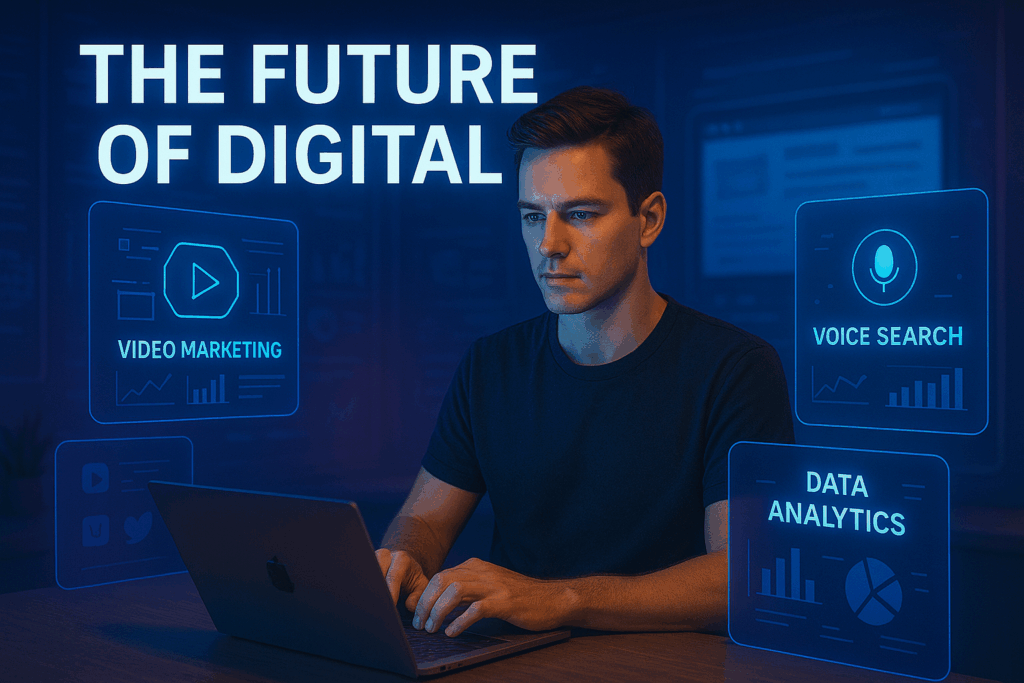Digital marketing has undergone massive shifts over the past decade, and 2025 is no exception. Today, success is no longer measured solely by how many people see your ads or visit your website. Instead, it hinges on how well you understand your audience, personalize your messaging, and adapt to the rapid evolution of technology. The future belongs to brands that are willing to innovate, humanize, and prioritize ethical, data-driven engagement.
Artificial Intelligence is Reshaping Everything
Artificial Intelligence is at the core of the new digital marketing reality. In 2025, AI is not just a tool for automation; it’s the brain behind intelligent decisions. Marketers now use AI to predict consumer behavior with impressive accuracy. By analyzing vast amounts of data from customer interactions, AI systems can suggest the best time to send emails, which content resonates most, and even what kind of language is likely to generate conversions. Smart tools can now generate copy, design banners, and even write SEO-optimized blog posts although the human touch still matters, especially for storytelling and emotional depth.
Search Engine Optimization Has Evolved
Search engine optimization has experienced a significant transformation. Keyword stuffing is long gone. Today, successful SEO is rooted in understanding search intent. Content that addresses specific user needs—whether it’s answering a question, solving a problem, or offering a unique perspective—tends to rank higher. Google and other AI-based search systems are increasingly prioritizing content that demonstrates expertise, trustworthiness, and helpfulness. Websites that focus on these values, while also being mobile-responsive and fast-loading, see better results.
Short-Form Video and Livestreaming Are Dominating Attention
Video continues to dominate the digital landscape, but short-form and live content are now the gold standard. Brands that post behind-the-scenes footage, live Q&A sessions, or quick, engaging reels are building stronger emotional connections with their audiences. Platforms like TikTok, Instagram Reels, and YouTube Shorts have changed how users consume content, quick, punchy, and authentic videos are far more likely to go viral than polished, scripted ads. Even B2B marketers are embracing short-form videos to explain concepts, share updates, or highlight success stories.
Social Media is Becoming the New Shopping Mall
Social platforms are no longer just spaces for engagement, they’re now full-fledged shopping ecosystems. Social commerce allows users to discover, review, and purchase products without ever leaving the app. Features like product tagging, in-app checkout, and influencer collaborations are making the buying journey smoother and faster. This has opened doors for user-generated content to take center stage. When customers post photos or videos of themselves using a product, it not only builds trust but also amplifies reach in a genuine, non-promotional way.
Email Marketing Is More Personalized Than Ever
Email marketing has made a strong comeback, too smarter and more personalized than ever. With AI-driven segmentation, marketers can tailor messages to each subscriber’s behavior and preferences. Instead of sending the same newsletter to an entire list, smart systems create unique emails for different segments. Some subscribers might receive product recommendations, others will get blog content, while some might be sent exclusive discounts. It’s this level of personalization that drives engagement and revenue in 2025’s hyper-connected digital world.
Data Privacy and Consent Are Reshaping Strategy
Personalization extends beyond email. It’s now a fundamental expectation across every touchpoint. From ads to landing pages, users want to feel seen. Companies are collecting first-party data ethically—by asking users what they like, encouraging signups, or analyzing interactions—so they can offer better experiences. This shift was accelerated by privacy regulations and the phasing out of third-party cookies, forcing marketers to be more transparent and creative in how they engage with customers.
Read Also: How to Start Digital Marketing With No Experience (Beginner’s Guide to Success)
Voice Search and Conversational Content Are Rising Fast
Voice search is another game-changer shaping digital marketing strategies in 2025. With the rise of smart assistants like Alexa, Siri, and Google Assistant, more people are using their voice to search for information. This changes how content is written. Instead of short keywords, voice search favors long-tail, conversational queries. As a result, brands are optimizing for natural language and including FAQs on their websites to cater to these new patterns. It’s a subtle yet powerful way to increase visibility and stay ahead in a competitive digital space.
AR and VR Are Creating Immersive Brand Experiences
Immersive technologies like augmented reality (AR) and virtual reality (VR) are transforming how customers interact with products. Online shoppers can now use AR to try on clothes, see how furniture fits into their home, or test makeup virtually—all from their smartphones. This not only enhances the shopping experience but also reduces return rates and boosts customer satisfaction. Brands that invest in these experiences are gaining a significant edge, particularly in retail, real estate, and home décor sectors.
Programmatic and Omnichannel Ads Are Taking Over
Even advertising is evolving rapidly. Traditional static ads are giving way to programmatic, data-driven, dynamic formats that change based on the user. With omnichannel advertising, brands can deliver consistent messages across social media, apps, email, and websites. The focus has shifted from “reach” to “relevance.” Modern consumers are bombarded with content every day; only the most tailored, meaningful ads break through the noise.
Purpose-Led Marketing Is Winning Trust
The ethical aspect of digital marketing is now more important than ever. Consumers are increasingly aware of how their data is used, and they’re quick to abandon brands that aren’t transparent. In response, businesses are adopting consent-first policies and using clear language when asking for information. Moreover, many are leaning into values-driven branding—championing sustainability, diversity, mental health, and social causes. This type of authentic alignment creates deeper brand loyalty and gives customers a reason to stick around beyond price or convenience.
The Rise of Emotional and Neuro-Based Branding
One often overlooked yet impactful strategy is the use of neuromarketing or neurobranding. This involves designing experiences and content that tap into human psychology like using specific colors, sounds, or emotional triggers to evoke trust or excitement. Brands that master emotional storytelling, use relatable narratives, and engage the senses are building stronger, longer-lasting relationships with their audiences.
Frequently Asked Questions
1. What is the most important digital marketing strategy in 2025?
There isn’t one single strategy that outshines the rest. Success in 2025 is based on integrating several key approaches—AI-powered personalization, value-driven branding, short-form video content, and ethical data use. However, creating human-centered, helpful, and authentic content across all platforms remains the core of any winning strategy.
2. Is SEO still important in 2025?
Yes, SEO is more important than ever. Search engines are becoming smarter, focusing on user intent, experience, and content quality. Optimizing for AI-based engines and voice search, while ensuring your website is fast, mobile-friendly, and trustworthy, is key to staying visible.
3. How does voice search affect digital marketing?
Voice search favors natural, conversational language. Marketers need to write content that mimics how people speak. Including FAQ sections and answering specific questions can help content appear in voice search results, giving brands a new edge.
4. Is email marketing still effective?
Absolutely. When done right, email marketing in 2025 is highly effective. AI allows for better segmentation, personalization, and timing—helping businesses reach the right people with the right message at the right time.
5. What’s the biggest mistake marketers make in 2025?
One of the biggest mistakes is relying too heavily on automation without maintaining a human voice. Tools are powerful, but users crave genuine interaction. Brands that balance tech efficiency with emotional resonance will always win in the long run.
Conclusion
Digital marketing in 2025 is a fusion of data, creativity, technology, and empathy. It’s no longer about being everywhere, it’s about being present in the right way, at the right time, with the right message. Brands that prioritize people over platforms, storytelling over selling, and personalization over promotion will not just survive they will thrive.
This is an era where authenticity matters more than aesthetics, and connection is more valuable than clicks. The marketers who succeed are not those with the biggest budgets, but those with the boldest visions and the deepest understanding of their audience. From AI and AR to voice search and values-driven branding, the future is full of tools and trends. But at the core of it all, digital marketing in 2025 is still about one thing: people. And those who serve them best, will grow the fastest.
Reference
Read Also
How to Start Digital Marketing With No Experience (Beginner’s Guide to Success)
Affiliate Marketing 101: What It Is and How to Get Started
10 Essential Skills Every Digital Marketer Needs in 2025
The Difference Between Social Media Management and Community Management


